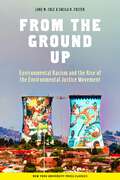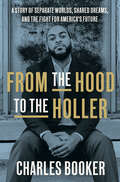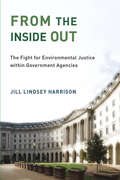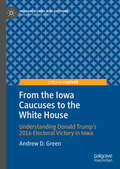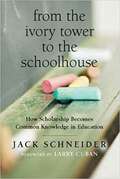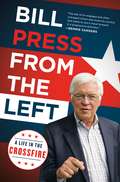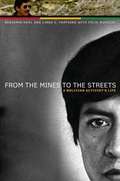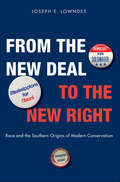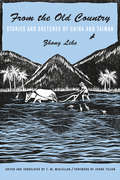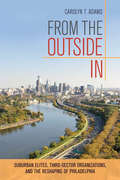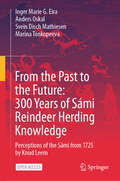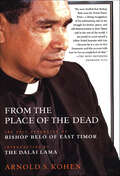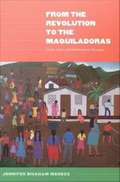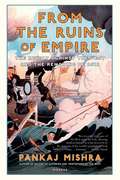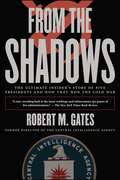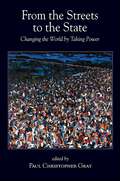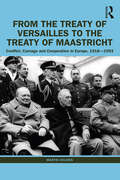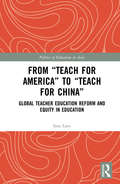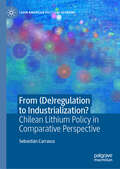- Table View
- List View
From the Ground Up: Environmental Racism and the Rise of the Environmental Justice Movement (Critical America #34)
by Luke W. Cole Sheila R. FosterA critical look at the movement for environmental justiceWhen Bill Clinton signed an Executive Order on Environmental Justice in 1994, the phenomenon of environmental racism—the disproportionate impact of environmental hazards, particularly toxic waste dumps and polluting factories, on people of color and low-income communities—gained unprecedented recognition. Behind that momentous signature, however, lies a remarkable tale of grassroots activism and political mobilization. Today, thousands of activists in hundreds of locales are fighting for their children, their communities, their quality of life, and their health.From the Ground Up critically examines one of the fastest growing social movements in the United States—the movement for environmental justice. Tracing the movement's roots, Luke Cole and Sheila Foster combine long-time activism with powerful storytelling to provide gripping case studies of communities across the US—towns like Kettleman City, California; Chester, Pennsylvania; and Dilkon, Arizona—and their struggles against corporate polluters. The authors use social, economic and legal analysis to reveal the historical and contemporary causes for environmental racism. Environmental justice struggles, they demonstrate, transform individuals, communities, institutions and the nation as a whole.
From the Hood to the Holler: A Story of Separate Worlds, Shared Dreams, and the Fight for America's Future
by Charles BookerKentucky State Representative Charles Booker tells the improbable story of his journey from one of the poorest neighborhoods in the country to a political career forging new alliances among forgotten communities across the New South and beyond.&“Charles Booker is a rising leader in our nation, and an inspiration to me and all those who get to know his story and vision.&”—Senator Cory BookerCharles Booker grew up in one of the poorest neighborhoods in Kentucky, living in the largely segregated West End of Louisville. Faith and love were everything in his family, but material comforts were scarce. The electricity was sometimes shut off. His mother often went hungry so her son could eat. Even after he graduated from law school, Booker rationed the insulin he took for diabetes. Determined to build a world in which poverty and racism would not plague future generations, he charted his own course into Kentucky politics, a world dominated by the myth of an urban-rural divide, and controlled by the formidable Republican establishment.In this stirring account, Booker unfolds his journey from the heart of Louisville to the deepest reaches of Kentucky&’s rural landscapes, reflecting the journey America itself must make on the way to a progressive future. Robbed of multiple family members by gun violence, Booker found the roots of a system built to fail him and his neighbors in everything from the hypocrisy of elected officials to the structural racism embedded in the state&’s budget. Yet it wasn&’t until his unlikely appointment to the Department of Fish and Wildlife Resources that he understood the transformative power of the issues that bound his family with those in rural Appalachia. In coal country, he met citizens who, like those in the West End, suffered from extreme isolation, for whom fresh food and economic stability were scarce, who lacked the resources to overcome their cynicism about change. Through his work as the youngest Black state legislator in Kentucky, Booker built an unprecedented alliance between the hood and the holler. This coalition was the basis for a thrilling grassroots Senate campaign that nearly stunned the nation, putting Senators Mitch McConnell and Rand Paul on notice that the days of business as usual were over. From the Hood to the Holler is both a moving coming-of-age story and an urgent political intervention—a much-needed blueprint for how equity and racial justice might transcend partisan divisions in Kentucky, throughout the South, and across America.
From the House to the Streets: The Cuban Woman's Movement for Legal Reform, 1898-1940
by K. Lynn StonerFrom the House to the Streets is the first study on feminists and the feminist movement in Cuba between 1902 and 1940. In the four decades following its independence form Spain in 1898, Cuba adopted the most progressive legislation for women in the western hemisphere. K. Lynn Stoner explains how a small group of women and men helped to shape broad legal reforms: she describes their campaigns, the version of feminism they adopted with all its contradictions, and contrasts it to the model of feminism North Americans were transporting to Cuba. Stoner draws on rich primary sources--texts, personal letters, journal essays, radio broadcasts, memoirs from women's congresses--which allow these women to speak in their own voices. In reconstructing the mentalit of Cuban feminists, who came primarily from a privileged social status, Stoner shows how feminism drew from traditional notions of femininity and a rejection of gender equality to advance a cause that assumed women's expanded roles were necessary for social progress. She also examines the values of the progressive male politicians who supported feminists and worked to change Cuban laws.
From the Inside Out: The Fight for Environmental Justice within Government Agencies (Urban and Industrial Environments)
by Jill Lindsey HarrisonAn examination of why government agencies allow environmental injustices to persist.Many state and federal environmental agencies have put in place programs, policies, and practices to redress environmental injustices, and yet these efforts fall short of meeting the principles that environmental justice activists have fought for. In From the Inside Out, Jill Lindsey Harrison offers an account of the bureaucratic culture that hinders regulatory agencies' attempts to reduce environmental injustices. It is now widely accepted that America's poorest communities, communities of color, and Native American communities suffer disproportionate harm from environmental hazards, with higher exposure to pollution and higher incidence of lead poisoning, cancer, asthma, and other diseases linked to environmental ills. And yet, Harrison reports, some regulatory staff view these problems as beyond their agencies' area of concern, requiring too many resources, or see neutrality as demanding “color-blind” administration. Drawing on more than 160 interviews (with interviewees including 89 current or former agency staff members and more than 50 environmental justice activists and others who interact with regulatory agencies) and more than 50 hours of participant observation of agency meetings (both open- and closed-door), Harrison offers a unique account of how bureaucrats resist, undermine, and disparage environmental justice reform—and how environmental justice reformers within the agencies fight back by trying to change regulatory practice and culture from the inside out. Harrison argues that equity, not just aggregated overall improvement, should be a metric for evaluating environmental regulation.
From the Iowa Caucuses to the White House: Understanding Donald Trump’s 2016 Electoral Victory in Iowa (Palgrave Studies in US Elections)
by Andrew D. GreenDonald Trump won a significant victory in Iowa in 2016. Although Iowa was carried by Barack Obama in 2008 and 2012, Trump won the popular vote in 93 of its 99 counties, 32 of which were carried by Obama in 2012. What explains this significant victory, in which a third of Iowa’s counties were flipped? Through a mixed-methods approach, this volume demonstrates that Trump’s electoral victory was shaped by three key factors: firstly, the electorate’s desire for “change” in Washington, D.C.; secondly, Trump’s successful appeals to both the Republican base and white, working-class voters who had previously supported Barack Obama; and thirdly, Iowa’s conservative ideological tendency regarding immigration and race. While contributing to emerging literature on the 2016 presidential elections, this book also serves to aid educators with a published resource on Iowa's electoral politics.
From the Ivory Tower to the Schoolhouse: How Scholarship Becomes Common Knowledge in Education
by Larry Cuban Jack SchneiderWhy do so many promising ideas generated by education research fail to penetrate the world of classroom practice? <p><p> In From the Ivory Tower to the Schoolhouse, education historian Jack Schneider seeks to answer this familiar and vexing question by turning it on its head. He looks at four well-known ideas that emerged from the world of scholarship—Bloom’s Taxonomy, multiple intelligences, the project method, and direct instruction—and asks what we can learn from their success in influencing teachers. <p><p> Schneider identifies four key factors that help bridge the gap between research and practice: perceived significance, philosophical compatibility, occupational realism, and transportability. Through the examination of counterexamples—similar ideas of equal promise that lacked these four qualities and did not translate into practice—Schneider shows the complexity of the relationship between theory and practice in education and suggests how that tenuous connection might be strengthened to help innovations and new insights gain traction in our schools.
From the Left: A Life in the Crossfire
by Bill Press"Bill Press has done it all. He was the Chair of the California Democratic Party, he has been involved in numerous campaigns, he has been a prolific writer, and has worked as a host and commentator on radio and TV. In other words, he knows politics inside and out. This is the tale of an engaged and often outraged citizen who loves his country and wants to see it move forward in a progressive direction." —Senator Bernie SandersA memoir of talk radio host and political commentator Bill Press.The name Bill Press is synonymous with honest journalism, intelligent commentary, and progressive politics.But based on where he came from, it's a wonder he didn't end up a Trump voter. He grew up in a blue-collar family in a small town in Delaware south of the Mason-Dixon line, where segregation was the rule. As a Catholic, he was taught that abortion, divorce, sex outside of marriage, and homosexuality were morally wrong: beliefs later reinforced in ten years of seminary studies for the priesthood. He was on his way to be a rock-ribbed conservative.So what went right for him that he swerved so far to the left? In From the Left, Press shows this gradual transformation, starting with two years of studies in Europe and a providential escape to California. From Sacramento he made his way to Southern California television and talk radio as a political commentator and liberal talk show host. Jumping to Washington and national cable TV, Press hosted Crossfire and The Spin Room on CNN, and Buchanan and Press on MSNBC. A member of the White House Press Corps and columnist for Tribune Media Services and The Hill, Press was an early supporter of Bernie Sanders and hosted two of the Senator's first presidential strategy sessions in his living room.If you're already on the left, you'll cheer a fellow traveler. If not yet there, you soon will be.
From the Margins: Historical Anthropology and Its Futures
by Brian Keith AxelHistorical anthropology: critical exchange between two decidedly distinct disciplines or innovative mode of knowledge production? As this volume's title suggests, the essays Brian Keith Axel has gathered in From the Margins seek to challenge the limits of discrete disciplinary epistemologies and conventions, gesturing instead toward a transdisciplinary understanding of the emerging relations between archive and field. In original articles encompassing a wide range of geographic and temporal locations, eminent scholars contest some of the primary preconceptions of their fields. The contributors tackle such topics as the paradoxical nature of American Civil War monuments, the figure of the "New Christian" in early seventeenth-century Peru, the implications of statistics for ethnography, and contemporary South Africa's "occult economies. " That anthropology and history have their provenance in--and have been complicit with--colonial formations is perhaps commonplace knowledge. But what is rarely examined is the specific manner in which colonial processes imbue and threaten the celebratory ideals of postcolonial reason or the enlightenment of today's liberal practices in the social sciences and humanities. By elaborating this critique, From the Margins offers diverse and powerful models that explore the intersections of historically specific local practices with processes of a world historical order. As such, the collection will not only prove valuable reading for anthropologists and historians, but also for scholars in colonial, postcolonial, and globalization studies. Contributors. Talal Asad, Brian Keith Axel, Bernard S. Cohn, Jean Comaroff, John L. Comaroff, Nicholas B. Dirks, Irene Silverblatt, Paul A. Silverstein, Teri Silvio, Ann Laura Stoler, Michel-Rolph Trouillot
From the Mines to the Streets
by Benjamin Kohl Linda Farthing Félix MuruchiFrom the Mines to the Streets draws on the life of Félix Muruchi to depict the greater forces at play in Bolivia and elsewhere in South America during the last half of the twentieth century. It traces Félix from his birth in an indigenous family in 1946, just after the abolition of bonded labor, through the next sixty years of Bolivia’s turbulent history. As a teenager, Félix followed his father into the tin mines before serving a compulsory year in the military, during which he witnessed the 1964 coup d’état that plunged the country into eighteen years of military rule. He returned to work in the mines, where he quickly rose to become a union leader. The reward for his activism was imprisonment, torture, and exile. After he came home, he participated actively in the struggles against neoliberal governments, which led in 2006—the year of his sixtieth birthday—to the inauguration of Evo Morales as Bolivia’s first indigenous president. The authors weave Muruchi’s compelling recollections with contextual commentary that elucidates Bolivian history. The combination of an unforgettable life story and in-depth text boxes makes this a gripping, effective account, destined to become a classic sourcebook.
From the New Deal to the New Right
by Joseph E. LowndesThe role the South has played in contemporary conservatism is perhaps the most consequential political phenomenon of the second half of the twentieth century. The region's transition from Democratic stronghold to Republican base has frequently been viewed as a recent occurrence, one that largely stems from a 1960s-era backlash against left-leaning social movements. But as Joseph Lowndes argues in this book, this rightward shift was not necessarily a natural response by alienated whites, but rather the result of the long-term development of an alliance between Southern segregationists and Northern conservatives, two groups who initially shared little beyond opposition to specific New Deal imperatives. Lowndes focuses his narrative on the formative period between the end of the Second World War and the Nixon years. By looking at the 1948 Dixiecrat Revolt, the presidential campaigns of George Wallace, and popular representations of the region, he shows the many ways in which the South changed during these decades. Lowndes traces how a new alliance began to emerge by further examining the pages of theNational Reviewand Republican party-building efforts in the South during the campaigns of Eisenhower, Goldwater, and Nixon. The unique characteristics of American conservatism were forged in the crucible of race relations in the South, he argues, and his analysis of party-building efforts, national institutions, and the innovations of particular political actors provides a keen look into the ideology of modern conservatism and the Republican Party.
From the Notebooks of a Middle School Princess (From the Notebooks of a Middle School Princess Ser.)
by Meg CabotReturn to the world of Meg Cabot's bestselling and beloved Princess Diaries series in From the Notebooks of a Middle School Princess—this time through the illustrated diary of a spunky new heroine: Princess Mia's long lost half-sister, Olivia!Olivia Grace Clarisse Mignonette Harrison is a completely average twelve-year-old: average height, average weight, average brown hair of average length, average brown skin and average hazel eyes. The only things about her that aren't average are her name (too long and princess themed), her ability to draw animals (useful for her future career as a wildlife illustrator), and the fact that she is a half-orphan who has never met her father and is forced to live with her aunt and uncle (who treat her almost like their own kids, so she doesn't want to complain).Then one completely average day, everything goes wrong: the most popular girl in school, Annabelle Jenkins, threatens to beat her up, the principal gives her a demerit, and she's knocked down at the bus stop . . .Until a limo containing Princess Mia Thermopolis of Genovia pulls up to invite her to New York to finally meet her father, who promptly invites her to come live with him, Mia, Grandmère and her two fabulous poodles . . . . Maybe Olivia Grace Clarisse Mignonette Harrison isn't so average after all!
From the Old Country
by T. M. Mcclellan Lihe Zhong Tiejun ZhongThough he lived mostly in rural South Taiwan, Zhong Lihe (1915--1960) spent several years in Manchuria and Peking, moving among an eclectic mix of ethnicities, classes, and cultures. His ficitonal portraits unfold on Japanese battlefields and in Peking slums, as well as in the remote, impoverished hill-country villages and farms of Zhong Lihe's native Hakka districts. His scenic descriptions are deft and atmospheric, and his psychological explorations are acute. The first anthology to present his work in English, this volume features two novellas, ten short stories, and four short prose works.
From the Old Country: Stories and Sketches of China and Taiwan (Modern Chinese Literature from Taiwan)
by Zhong Lihe. Edited Translated by T. M. McClellan. Foreword by Zhong TiejunThough he lived most of his life in rural South Taiwan, Zhong Lihe spent several years in Manchuria and Peking, moving among an eclectic mix of ethnicities, social classes, and cultures. His fictional portraits unfold on Japanese battlefields and in Peking slums, as well as in the remote, impoverished hill-country villages and farms of his native Hakka districts. His scenic descriptions are deft and atmospheric, and his psychological explorations are acute. The first anthology to present his work in English, this volume features two novellas, ten short stories, and four short prose works.
From the Outside In: Suburban Elites, Third-Sector Organizations, and the Reshaping of Philadelphia
by Carolyn T. AdamsIn From the Outside In, Carolyn T. Adams addresses the role of suburban elites in setting development agendas for urban municipalities and their larger metropolitan regions. She shows how major nongovernmental, nonmarket institutions are taking responsibility for reshaping Philadelphia, led by suburban and state elites who sit on boards and recruit like-minded suburban colleagues to join them. In Philadelphia and other American cities, Third Sector organizations have built and expanded hospitals, universities, research centers, performing arts venues, museums, parks, and waterfronts, creating whole new districts that are expanding outward from the city's historic downtown. The author draws on three decades of scholarship on Philadelphia and her personal experience in the city's nonprofit world to argue that suburban elites have recognized the importance of the central city to their own future and have intervened to redevelop central city land and institutions. Suburban interests and state allies have channeled critical investments in downtown development and K-12 education. Adams contrasts those suburban priorities with transportation infrastructure and neighborhood redevelopment, two policy domains in which suburban elites display less strategic engagement. From the Outside In is a rich examination of the promise and difficulty of governance that is increasingly distinct from elected government and thus divorced from the usual means of democratic control within an urban municipality.
From the Past to the Future: Perceptions of the Sámi from 1725 by Knud Leem
by Anders Oskal Svein Disch Mathiesen Marina Tonkopeeva Inger Marie EiraThis open access book provides a unique way of documenting traditional Sámi knowledge that has survived almost 300 years followed by today&’s analysis of the modern state of Sámi reindeer husbandry. Reindeer herders&’ knowledge, their language and ways of managing the herds have hardly changed over the past centuries. It is the same ancient knowledge that now forms the basis for how reindeer herders think and carry out their operations. The book shows sustainable reindeer husbandry—with long continuity in knowledge and practices—which is still used today. It gives an overview of the knowledge systems and technical language of an ancient industry that has survived through millennia and is still crucial today. Our vision with this book is to highlight the long perspectives of Sámi reindeer herders&’ indigenous knowledge based on what Knud Leem did at the beginning of the eighteenth century. The content is based on Knud Leem's translated version of Description over Finmarkens Lapper, their language of language, lifestyle and past idolatry. There is a direct need for this unique material to be published in English to provide access to the knowledge of the time to a wider audience. In the rest of the world, the eighteenth century is getting more and more attention in both national and international research: it is in this period that modern ways of thinking about religion, politics, science, and society find their form. Movements and ideas from the eighteenth century are important as they structure our ideas and discussions to this day. Therefore, Knud Leem's descriptions of the Sámi in the eighteenth century will also be important today and in future. Leem was a unique researcher of his time as he collected all material in Sámi.
From the Place of the Dead: The Epic Struggles of Bishop Belo of East Timor
by Arnold S. KohenWinner of the Christopher Award, From the Place of the Dead is the definitive account of one of the worst human rights tragedies in contemporary history.East Timor's struggle for independence under Indonesian occupation has dominated international headlines. Now, as UN troops uphold the August 1999 referendum calling for the island nation's self-rule, From the Place of the Dead offers the only up-to-date, comprehensive analysis of the confrontation through the eyes of one of the most extraordinary leaders to emerge from the crisis. Bishop Carlos Ximenes Belo, Winner of the Nobel Prize for Peace in 1996, has been a fearless guardian of the basic human rights of the East Timorese people. Arnold Kohen's intimate knowledge of the political, religious, and social history of the region paints a penetrating portrait of this beleaguered nation and reveals the extent of international complicity in the violence.
From the Revolution to the Maquiladoras: Gender, Labor, and Globalization in Nicaragua
by Jennifer Bickham MendezFrom the Revolution to the Maquiladoras is a major contribution to the study of globalization, labor, and women's movements. Jennifer Bickham Mendez presents a detailed ethnographic account of the Nicaraguan Working and Unemployed Women's Movement, "Mara Elena Cuadra" (mec), which emerged as an autonomous organization in 1994. Most of its efforts revolve around organizing women workers in Nicaragua's free trade zones and working to improve conditions in maquiladora factories. Mendez examines the structural and cultural elements of mec in order to demonstrate how globalization affects grassroots advocacy for social and economic justice. She argues that globalization has created opportunities for new forms of organizing among those local populations that suffer its effects and that mec, which has forged vital links with transnational feminist and labor groups, exemplifies the possibilities--and pitfalls--of this new type of organizing. Mendez draws on interviews with leaders and program participants, including maquiladora workers; her participant observation while she worked as a volunteer within the organization; and analysis of the public statements, speeches, and texts written by mec members. She provides a sense of the day-to-day operations of the group as well as its strategies. By exploring the tension between mec and transnational feminist, labor, and solidarity networks, she illustrates how mec women's outlooks are shaped by both their revolutionary roots within the Sandinista regime and their exposure to global discourses of human rights and citizenship. The complexities of the women's labor movement analyzed in From the Revolution to the Maquiladoras speak to social and economic justice movements in the many locales around the world.
From the Ruins of Empire: The Revolt Against the West and the Remaking of Asia
by Pankaj MishraA little more than a century ago, independent thinkers across Asia sought to frame a distinct intellectual tradition that would inspire the continent's rise to dominance. Yet this did not come to pass, and today those thinkers--Tagore, Gandhi, and later Nehru in India; Liang Qichao and Sun Yat-sen in China; Jamal al-Din al-Afghani and Abdurreshi al Ibrahim of the Ottoman Empire--are seen as outsiders within the main anticolonial tradition. But as Pankaj Mishra demonstrates in this enthralling portrait of like minds, Asia's revolt against the West is not the one led by faith-fired terrorists and thwarted peasants; rather, it is rooted in the ideas of these once renowned intellectuals. Now, when the ascendency of Asia seems possible as never before, From the Ruins of Empire is as necessary as it is timely--a book indispensable to our understanding of the world and our place in it.
From the Shadows: The Ultimate Insider's Story of Five Presidents and How They Won the Cold War
by Robert M. GatesAs the only person to rise from entry-level analyst to Director of the CIA and to serve on the White House staffs of four Presidents, Robert Gates is uniquely qualified to tell the unprecedented inside story of the Cold War. Drawing on his access to classified information and top-level involvement in policy decisions, Gates lays bare the hidden wars and operations the United States wages against communism worldwide. Ever certain that the fifty-year struggle with the Soviet Union was indeed a war, Gates makes candid appraisals of Presidents, key officials, and policies of the period. From the Shadows is a classic memoir on the career of a CIA officer at the centre of power during a time when the threat of global annihilation informed America's every move.
From the Streets to the State: Changing the World by Taking Power (SUNY series in New Political Science)
by Paul Christopher GrayFor decades, emancipatory struggles have been deeply influenced by the slogan "Change the world without taking power." Amid growing social inequalities and the return of right-wing authoritarianism, however, many now recognize the limits of disengaging from government and the state. From the Streets to the State chronicles many diverse and exciting projects to not only take state power but to fundamentally change it. A blend of scholars and activists explore issues like the nonsectarian relationships between new radical left parties, egalitarian social movements, and labor movements in Greece, Germany, Spain, Portugal, and Turkey. Contributors discuss municipal campaigns based in popular assemblies, solidarity economies, and independent political organizations fighting for racial, gender, and economic justice in cities such as Jackson, Vancouver, and Newcastle. This volume also studies the lessons learned from the Pink Tide in Latin America as well as the social movements of racialized and gendered workers transforming human rights across the United States. Finally, the book offers case studies from around the world surveying the role of state workers and public sector unions in radically democratizing public administration through coalitions between the providers and users of public services.
From the Treaty of Versailles to the Treaty of Maastricht: Conflict, Carnage And Cooperation In Europe, 1918 – 1993
by Martin HolmesThis book examines European history and politics between two very well-known but flawed treaties: The Treaty of Versailles and the Treaty of Maastricht. Taking the Treaty of Versailles, signed following World War I, as a starting point, the volume argues that while it was well-intentioned to the point of being utopian, it was also totally impractical, rearranging the map of Europe in a way which led to the tragic descent into conflict and barbarism in World War II. The volume then moves through the post war period, the outcome of the war producing the uneasy stability of a Cold War divided continent, and with the establishment of NATO in 1949, the process of European integration ushered in the era of cooperation. Under the influence of Charles de Gaulle, the newly created European Community acted as an association of sovereign states led by France and Germany, spurring economic growth and encouraging other countries to apply to join. After de Gaulle’s retirement in 1969, this approach was progressively abandoned in favour of a federal model of integration in which member states transferred their sovereignty to the institutions of what became the European Union. Europe was to be transformed from a continent to a country. The book concludes by analysing the Maastricht treaty, which enshrined this process, as being as fatally flawed as the Versailles Treaty and charts the post-Maastricht slow decline of the European Union giving way to widespread Euroscepticism. From the Treaty of Versailles to the Treaty of Maastricht will appeal to researchers and students alike interested in European history, politics and World War I and II.
From the Tricontinental to the Global South: Race, Radicalism, and Transnational Solidarity
by Anne Garland MahlerIn From the Tricontinental to the Global South Anne Garland Mahler traces the history and intellectual legacy of the understudied global justice movement called the Tricontinental—an alliance of liberation struggles from eighty-two countries, founded in Havana in 1966. <P><P>Focusing on racial violence and inequality, the Tricontinental's critique of global capitalist exploitation has influenced historical radical thought, contemporary social movements such as the World Social Forum and Black Lives Matter, and a Global South political imaginary. The movement's discourse, which circulated in four languages, also found its way into radical artistic practices, like Cuban revolutionary film and Nuyorican literature. <P>While recent social movements have revived Tricontinentalism's ideologies and aesthetics, they have largely abandoned its roots in black internationalism and its contribution to a global struggle for racial justice. In response to this fractured appropriation of Tricontinentalism, Mahler ultimately argues that a renewed engagement with black internationalist thought could be vital to the future of transnational political resistance.
From the War on Poverty to the War on Crime: The Making of Mass Incarceration in America
by Elizabeth HintonHow did the land of the free become the home of the world's largest prison system? Elizabeth Hinton traces the rise of mass incarceration to an ironic source: not the War on Drugs of the Reagan administration but the War on Crime that began during Johnson's Great Society at the height of the civil rights era.
From “Teach For America” to “Teach For China”: Global Teacher Education Reform and Equity in Education (Politics of Education in Asia)
by Sara LamThis book examines the role of Teach For China in addressing educational equity and expanding public participation in education. The author uses the case of Teach For China to explore the broader theme of the mobility of education models between contexts characterized by neoliberalism and those characterized by strong state control. Transnational advocacy networks are increasingly influential in the education policy making process. These networks, comprised of entrepreneurs and education corporations, think tanks, philanthropists, and government agencies, facilitate the global mobility of policy models. It is widely accepted that an education model should not be transplanted from one context to another without careful consideration of how contextual differences might impact the model’s effectiveness. The book explores the argument that the same model is not only quantitatively different in terms of effectiveness, but that models can play qualitatively different roles in neoliberal and strong-state contexts, sometimes moving education reform in opposite directions. The book will appeal to anyone interested in global teacher education reform and equity in education.
From: Chilean Lithium Policy in Comparative Perspective (Latin American Political Economy)
by Sebastián CarrascoThis book aims to elucidate the divergent institutional trajectories of lithium policies in Latin America, shedding light on how industrial development of mining activities can emerge in specific extractivist contexts. While focusing primarily on Chile's lithium policy, the study is further enriched by shadow case analyses of Argentina and Bolivia, reinforcing the robustness of the findings. The research introduces an original typology of industrial policies associated with lithium and argues that the interaction between the state and the companies involved in lithium extraction plays a decisive role in shaping public policy. In this regard, the typology demonstrates its heuristic capacity to analyze green industrialization processes related to lithium. Grounded in theories of state capacity and business power, this analysis posits that the evolution of public policies in this sector is influenced not only by the strength of the state but also by the strategic positioning of businesses in relation to these policies. Given their pivotal role in natural resource-based economic activities, companies emerge as essential actors within the context of industrial policy. This analysis makes a theoretical contribution to state-business relations, engaging with broader debates on green industrial policy within comparative political economy and offering a fresh perspective on the topic. Furthermore, the research explores how these processes related to lithium policies intersect with both global and local dynamics, particularly regarding the advancement of energy transitions and the socio-environmental conflicts in the affected territories.
